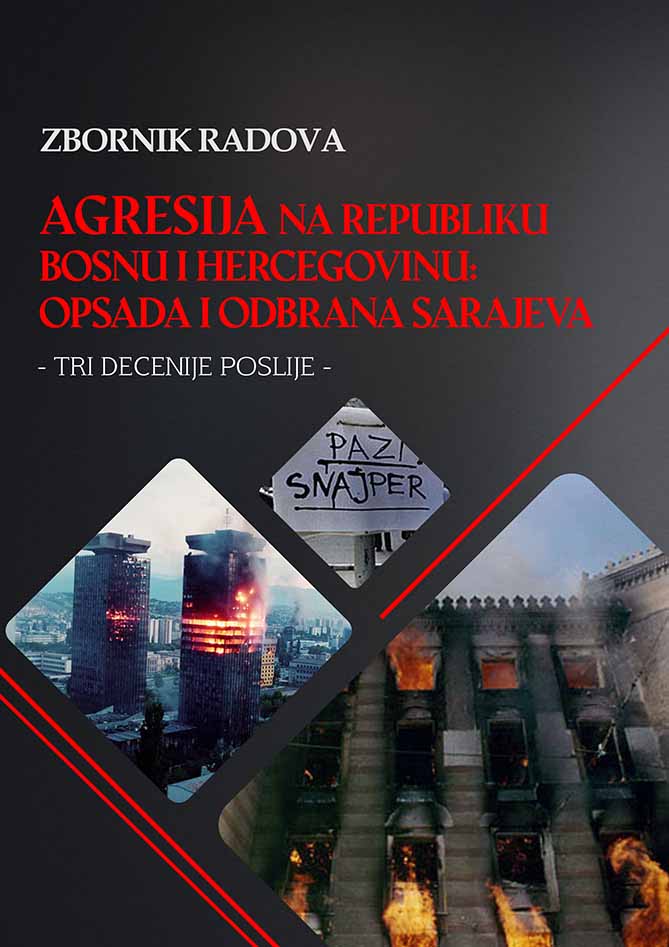ISTRAGE, OPTUŽNICE I PRESUDE U PREDMETIMA RATNIH ZLOČINA U PROCESU USPOSTAVE POVJERENJA I POMIRENJA NARODA I DRŽAVA ZAPADNOG BALKANA
INVESTIGATIONS, INDICTMENTS, AND JUDGMENTS IN WAR CRIME CASES IN THE PROCESS OF THE BUILDING OF TRUST AND RECONCILIATION BETWEEN THE PEOPLES AND STATES IN THE WESTERN BALKANS
Author(s): Ismet Alija
Subject(s): Criminal Law, International Law, Law and Transitional Justice, Military history, Government/Political systems, Studies in violence and power, Transformation Period (1990 - 2010), Peace and Conflict Studies
Published by: Institut za istraživanje zločina protiv čovječnosti i međunarodnog prava Univerziteta u Sarajevu
Keywords: aggression; crimes; judiciary; Prosecutor’s Office of BiH; Dobrovoljačka street; trust; reconciliation; Dayton Agreement; Serbia; Federal Republic of Yugoslavia; Bosnia and Herzegovina;
Summary/Abstract: The political goal of the total demographic extermination of the Bosniac Muslim people in Bosnia and Herzegovina is evidenced by the criminal practice on the part of the aggressor, which tried to systematically persecute said people from the territory in which they always lived. Such a goal could not be achieved in another way, but by criminal methods of waging warfare. In order to cover up the aggressive nature of the military force use against the Republic of Bosnia and Herzegovina, presenting it as a civil war within an internationally recognized country, the Belgrade regime established a so-called Republika Srpska para-state and constituted an army of the said para-state, which made an integral part of the Army of the Federal Republic of Yugoslavia (FRY). The unjust and criminal political and military goals determined and directed the war of aggression primarily against the non-Serb civilian population, and only than against the other armed forces, given that most of the killed victims were civilians. The unjust policy based on the great-Serbian ideology against Bosnia and Herzegovina continued even after the signing of the General Frame-work Agreement for Peace in Bosnia and Herzegovina (hereinafter the Dayton Agreement), and continued up to the present day. This is just another proof that Serbia has not yet sincerely and in good faith recognized territorial integrity and the sovereignty of Bosnia and Herzegovina, indicating that all anomalies and blockades in the implementation of the Dayton Agreement are a signal that Serbia, as of this day, does not consider its internationally recognized borders as being final. Such policy of the Belgrade regime is most concretely and indeed most destructively manifested in their attempts to cover up war crimes and glorify war criminals, aspiring to shifting the blame for starting the war and its consequences onto victims, and in that regard to equalize responsibility of the aggressor and Bosnia and Herzegovina defenders, ultimately to change the character of war. It is precisely the reason why the judiciary in the states that acted as aggressors against Bosnia and Herzegovina in the period 1991-1995 was burdened with anomalies resulting in blockades, even the setbacks in the commitments from the Dayton Agreement. This is the reason why trust cannot be built and reconciliation cannot be achieved on such foundations between the peoples and states of the Western Balkans. In that context, various concrete cases of unjust and illegal protection of war criminals should be analyzed, as well as numerous indictments fabricated by the Serbian regime and the Bosnia and Herzegovina entity of Republika Srpska should be considered. Obvious example of such practice is the indictment, including its confirmation, related to the events in Sarajevo’s Dobrovoljačka Street on May 3, 1992.
Book: AGRESIJA NA REPUBLIKU BOSNU I HERCEGOVINU: OPSADA I ODBRANA SARAJEVA – TRI DECENIJE POSLIJE –
- Page Range: 257-285
- Page Count: 29
- Publication Year: 2023
- Language: Bosnian
- Content File-PDF

